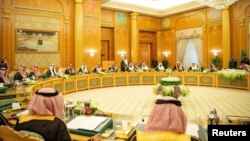Saudi Arabia plans to increase state spending by 7 percent next year in an effort to spur economic growth that has been hurt by low oil prices, according to a 2019 state budget announced by King Salman on Tuesday. Spending is projected to rise to an all-time high of 1.106 trillion riyals ($295 billion), from an actual 1.030 trillion riyals this year.
"We are determined to go ahead with economic reform, achieving fiscal discipline, improving transparency and empowering the private sector," the king said in a nationally televised speech.
The economy shrank last year and, although the government estimates it grew 2.3 percent in 2018, that is much slower than the boom years early this decade — and not enough to put much of a dent in a record jobless rate of 12.9 percent among Saudis.
"The budget focuses on boosting activity after years of fiscal consolidation and weak growth," said Monica Malik, chief economist at Abu Dhabi Commercial Bank.
Because of the ramp-up in spending, the 2019 budget also appears to mark a slowing of Saudi Arabia's drive to cut a big state budget deficit caused by the oil price slump.
The deficit, which the government has pledged to eliminate by 2023, came in at 136 billion riyals this year, well below the 195 billion riyal gap originally projected for 2018.
That was partly because of higher oil export revenues; Brent oil has averaged about $73 a barrel so far this year, up from $54 in 2017. But Riyadh also boosted non-oil revenues with tough austerity steps such as the imposition of a 5 percent value-added-tax at the start of 2018.
Next year, the government projects only a minimal further shrinking of the deficit to 131 billion riyals. Malik said her assumptions for Saudi gross domestic product and oil revenue suggested the deficit might actually widen back in 2019, to over 7 percent of GDP from near 4 percent.
Saudi Arabia does not disclose the oil price assumptions on which its planning is based, but Malik and some other private economists estimated the 2019 budget implied Brent at $70-71 per barrel with oil production at 10.2 million barrels per day.
Jean-Paul Pigat, head of research at Lighthouse Research in Dubai, said the budget's increase in spending was lower than he had expected.
"Government spending is what ultimately drives growth in Saudi, and the wider region, and without stronger stimulus, it is difficult to see where the spark for stronger demand will come from," he said.
However, Pigat added that more stimulus might come in the form of off-budget spending by the Public Investment Fund, the kingdom's main sovereign wealth fund, which is embarking on multi-billion-dollar projects to develop Saudi Arabia's tourism, entertainment and real estate industries.





